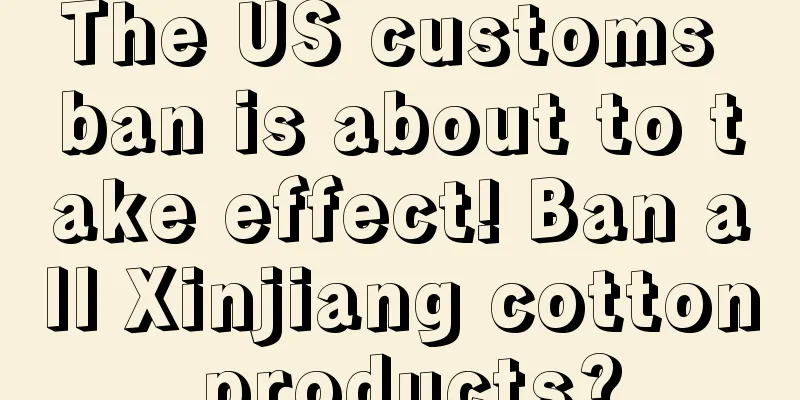|
▶ Video account attention cross-border navigation Last year, with HM's boycott of Xinjiang cotton as the fuse, a number of foreign brands such as Adidas, Nike, Uniqlo, etc. joined the boycott of Xinjiang cotton and became the targets of "confrontation" by the people. Their performance declined one after another, and the impact of the incident was unprecedented. Recently, Nike announced that it will stop operating the Nike Run Club app in China from July. Nike's latest financial report shows that in the third fiscal quarter ending in February, the Chinese market was the only region where Nike's sales fell year-on-year. At the same time, while the anger of the Chinese people over the Xinjiang cotton incident has not yet subsided, the various "sassy operations" abroad on Xinjiang cotton are far from over. Recently, there was news that the United States issued a notice on strict inspection of textile goods. The US Customs issued a ban and will seize all Xinjiang cotton goods! It is learned that recently, freight forwarders have issued the following notices: Recently, the U.S. Customs has strictly inspected textile goods. The inspection mainly checks whether the textile goods contain Xinjiang cotton . Once the customs inspects, the goods will be detained and released only when the customer provides relevant proof that the goods do not contain Xinjiang cotton. The new implementation guidelines are expected to take effect on June 21 . ▲ The picture comes from the seller communication group It is understood that this is not the first time that the US Customs has reportedly strictly checked Xinjiang cotton. Just last March, there was news that textile and clothing foreign trade companies in Shanghai, Jiangsu, Zhejiang and other places had received notices from US buyers asking them "not to use Xinjiang cotton" and that the clothing and textiles in their orders must not contain "any Xinjiang cotton ingredients." ▲ The picture comes from the seller communication group It is reported that as early as December last year, the US government signed the Uyghur Forced Labor Prevention Act (UFLPA). According to the bill, unless a company can provide "clear and convincing evidence" and obtain certification from the US government, the United States will determine that all products manufactured in Xinjiang use "forced labor" and prohibit the import of these products in accordance with the US Tariff Act of 1930. According to foreign media reports, the US authorities are expected to implement the Uyghur Forced Labor Prevention Act on June 21, and will impose an import ban on goods from China's Xinjiang region in accordance with the bill. In addition to not being able to use Xinjiang cotton, the following documents must be submitted when exporting cotton products: - The certificate of origin must indicate the customer's purchase order information and the address of the factory where the goods are produced.
- The seller self-assured that the exported product does not contain cotton from the region.
- Cotton raw silk purchase order and invoice.
- Cotton thread purchase order and invoice.
- Cotton purchase order and invoice.
- Any additional documentation required to comply with U.S. Customs orders.
Recently, China Cotton Information Network, China Yarn Network, China Economic Times, Global Textile Network and other websites have also released related news, stating that starting from June 2022, the U.S. Customs will strengthen inspections on cotton products imported from China. At this point, it can be determined that the news released by the US Customs on the Xinjiang cotton ban is basically true. Many cross-border textile sellers are indignant about the news and are also worried about the future of textile export trade. The bill impacts textile exports. Where do cross-border sellers go? Relevant reports show that China's textile industry is the largest exporter of leading global brands. Among them, Xinjiang, as the base camp of China's cotton industry, accounts for 84.9% of the country's total cotton production , ranking first in the country for 25 consecutive years, and is undoubtedly the biggest contributor to China's textile industry and cotton industry. According to feedback from sellers, since the United States signed the "Prevention of Forced Uyghur Labor Act", some brands in Europe and Japan have stopped or reduced the use of Xinjiang cotton, and some American clothing brands may no longer place orders with China in the future. In the seller communication group, many sellers believed that clothing, bedding and other textile goods may be restricted after receiving the news. ▲ The picture comes from the seller communication group Another seller mentioned that the United States has clearly stated that from June 21 , the products it purchases must undergo DNA testing by U.S. Customs . Once it is found that the cotton used in the product comes from Xinjiang, China, Uzbekistan and Turkmenistan, it will be destroyed on the spot. Some sellers even said that just in case, they planned to change their product selection and stop selling clothing. ▲ The picture comes from the seller communication group There is no doubt that the ban issued by the US Customs is tantamount to a sword piercing the flapping wings of China's textile exports. However, it is also understood that under the US government's ban, not only China's cotton spinning industry has been affected to a certain extent, but the domestic textile industry in the United States is facing huge risks. In addition to the sharp drop in sales of foreign brands in China due to the boycott of Xinjiang cotton, experts also said that the US government's "textile withholding order" has actually increased the cost of the industry, making US importers and consumers the main "bill payers". US retailer Dillard also mentioned that the US government's "textile withholding order" will affect the global supply chain, including the company's cotton products. Some sellers speculated that it is unlikely that the United States can continue this kind of "hurting the enemy a thousand and hurting itself eight hundred" operation for a long time. As of now, we have not learned how the DNA test mentioned by the US Customs is conducted. According to the feedback from sellers, the sea transportation of sellers in the clothing category has not been affected for the time being. However, given that there have been rumors that Amazon and other e-commerce platforms have removed Xinjiang cotton products from their shelves, we would like to remind relevant sellers that in addition to making preparations in advance to deal with customs inspections , sellers who are currently selling related products on cross-border e-commerce platforms should delete the sensitive words "xinj*ang cot*on" in batches in advance, or replace them with "cot*on". Finally, I would like to call on Chinese sellers to adhere to the bottom line of defending national interests no matter what kind of ban the United States implements to boycott Xinjiang cotton. Let us support China and Xinjiang cotton together! |










